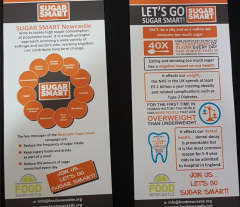Theme 1
Diet related ill health and access to food
The link between what we eat and our health and well-being is well documented. A poor-quality diet, along with being overweight or obese increases the risk of getting coronary heart disease, type 2 diabetes and some forms of cancer. Being overweight or obese can also have negative impacts on emotional well-being.
The World Health organisation explains Diet, nutrition and the prevention of chronic diseases:
- Obesity: the imbalance between declining energy expenditure due to physical inactivity and high energy in the diet (excess calories whether from sugar, starches or fat) is the main determinant of the obesity epidemic.
- Diabetes: excess weight gain, overweight and obesity and physical inactivity account for the escalating rates of type 2 diabetes, worldwide. Diabetes leads to increased risk of heart disease, kidney disease, stroke and infections.
- Cardiovascular diseases: cardiovascular diseases, the major killers worldwide, are to a great extent due to unbalanced diets and physical inactivity. Risk of their main forms, heart disease and stroke, is reduced by eating less saturated and trans fats, and sufficient amounts of (n-3 and n-6) polyunsaturated fats, fruits and vegetables and less salt, as well as by physical activity and controlling weight. Reduction of salt intake helps reduce blood pressure, a major cause of cardiovascular diseases.
- Cancer: dietary factors contribute significantly to some types of cancer. Maintaining a healthy weight will reduce the risk for cancers of the oesophagus, colorectum, breast, endometrium and kidney. Limiting alcohol intake will reduce risk for cancers of the mouth, throat, oesophagus, liver and breast. Ensuring an adequate intake of fruit and vegetables should further reduce risk for oral cavity, oesophagus, stomach and colorectal cancer.
- Osteoporosis and bone fractures: fragility fractures are a problem of older people. Adequate intakes of calcium (500 mg per day or more) and of vitamin D in populations with high osteoporosis rates helps to reduce fracture risk, so does sun exposure and physical activity to strengthen bones and muscles.
- Dental disease: caries is preventable by limiting the frequency and amount of consumption of sugars and by appropriate exposure to fluoride. Erosion of teeth by dietary acids in beverages or other acidic foods may contribute to tooth destruction.
The prevalence of obesity in Newcastle is one of the highest in the country and childhood obesity is a significant problem in the city. So what is Newcastle doing to help improve diet related ill health?
- SUGAR SMART Newcastle Campaign
- Newcastle Refill Campaign
- Newcastle Can!
- Change4Life East Newcastle Partnership
- Change4Life West Newcastle Partnership
For more information contact David Stobbs: david.stobbs@newcastle.gov.uk








